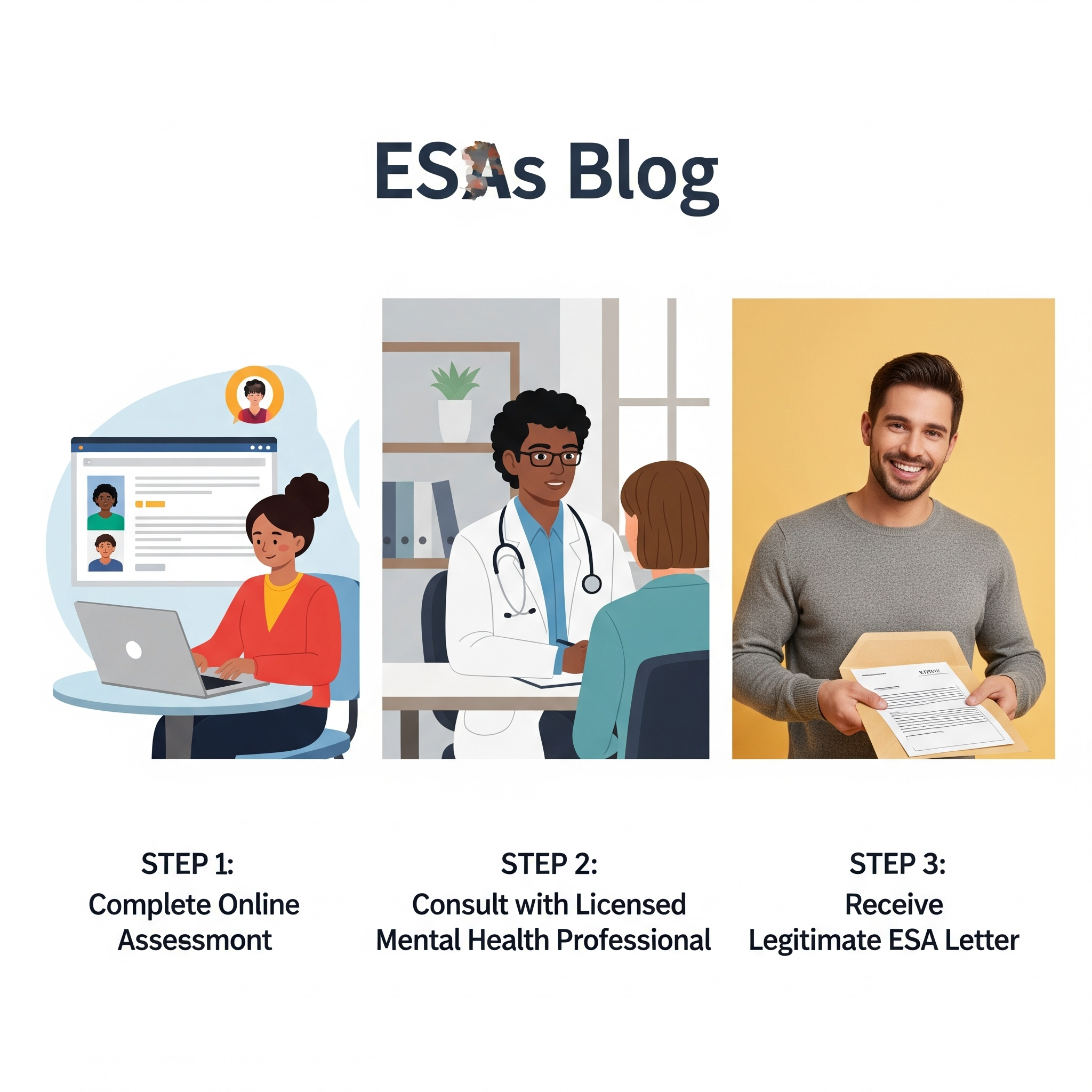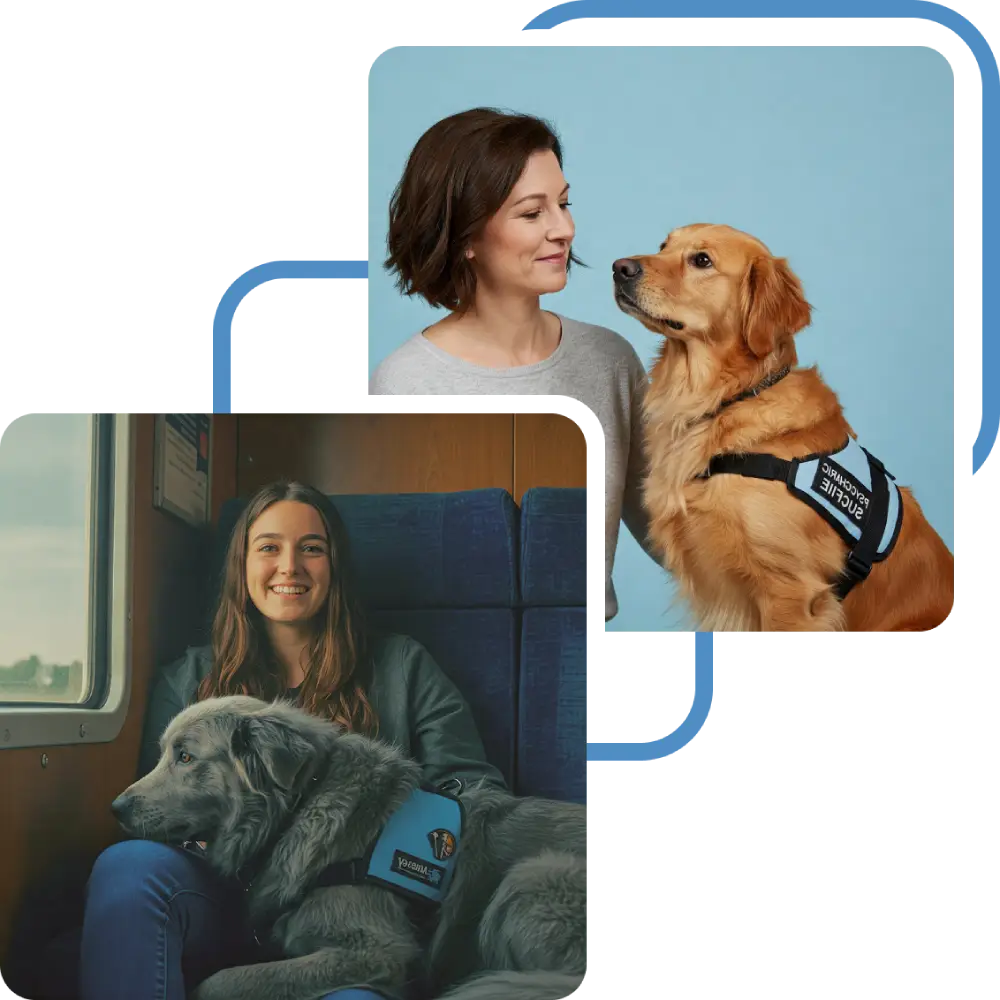Unlocking the Potential of Your Canine Companion for Mental Health Support
For individuals navigating the complexities of mental health conditions, a Psychiatric Service Dog (PSD) can be an invaluable partner. Unlike Emotional Support Animals (ESAs), which provide comfort through their presence, PSDs are specifically trained to perform tasks that directly mitigate the symptoms of a psychiatric disability. This crucial distinction grants PSDs broader public access rights under the Americans with Disabilities Act (ADA).
At CertifyESA, while our primary focus is on connecting individuals with licensed mental health professionals for legitimate ESA and PSD letters, we also understand the profound impact a well-suited canine companion can have. If you’re considering a PSD, you might be wondering if your current dog, or a dog you’re considering adopting, has what it takes. This blog will explore the key characteristics and behaviors that suggest your dog could make a great Psychiatric Service Dog, helping you identify potential and understand the path forward.
Understanding the PSD Role: More Than Just a Pet
Before diving into specific signs, it’s essential to grasp the fundamental difference between a pet, an ESA, and a PSD.
-
Pet: Provides companionship and enjoyment, but without specific training or official designation for a disability.
-
Emotional Support Animal (ESA): Provides comfort and emotional support through its presence, alleviating symptoms of a mental or emotional disability. ESAs do not require specialized task training and are primarily recognized under the Fair Housing Act.
-
Psychiatric Service Dog (PSD): A dog specifically trained to perform work or tasks directly related to a person’s psychiatric disability. These tasks are not simply comforting behaviors but actions that help manage or mitigate the disability’s effects (U.S. Department of Justice, 2020).
Examples of PSD tasks include:
-
Deep Pressure Therapy (DPT): Lying across or leaning into a person to provide calming pressure during anxiety attacks or panic.
-
Medication Reminders: Nudging or barking to remind the handler to take medication.
-
Interrupting Self-Harm or Destructive Behaviors: Nudging, licking, or pawing to interrupt repetitive or harmful actions.
-
Crowd Control/Space Management: Creating a buffer around the handler in crowded spaces for those with social anxiety or agoraphobia.
-
Alerting to Dissociation or Hallucinations: Grounding the handler by nudging or bringing them back to reality.
-
Finding an Exit/Guiding: Guiding a disoriented handler to an exit during an anxiety attack.
-
Nightmare Interruption: Waking a handler during a nightmare.
Key Traits of a Potential Psychiatric Service Dog
While any breed can technically be a service dog, certain innate traits and behaviors are strong indicators that a dog has the temperament and aptitude to excel in the demanding role of a PSD.
1. Calm Temperament and Low Reactivity
A service dog must remain calm and focused in a variety of environments, from quiet homes to bustling public spaces.
-
Unflappable in New Environments: Does your dog handle new places, sounds (e.g., sirens, loud children), and smells without becoming overly stressed, fearful, or excited?
-
Minimal Reactivity: Does your dog react calmly to other dogs, people, and unexpected stimuli? Excessive barking, lunging, or shying away are red flags.
-
Quick Recovery from Startle: If startled, does your dog quickly recover and regain composure, rather than dwelling on the event or escalating their reaction?
2. High Trainability and Eagerness to Please
PSDs require extensive training, often learning complex tasks. A dog that is eager to learn and motivated by praise or treats is ideal.
-
Picks Up Commands Quickly: Does your dog learn new tricks or commands with relative ease?
-
Motivated by Rewards: Is your dog highly motivated by treats, toys, or verbal praise, making training sessions productive and enjoyable?
-
Focus and Attention Span: Can your dog maintain focus on you amidst distractions? A short attention span can hinder task training.
3. Confidence and Adaptability
A PSD needs to be confident enough to navigate diverse situations and adaptable to changes in routine or environment.
-
Comfortable in Public: Does your dog show confidence when encountering new people, surfaces (e.g., slippery floors), or objects (e.g., automatic doors)?
-
Handles Change Well: Does your dog adjust easily to changes in your schedule or if you take them to unfamiliar places?
-
Not Easily Stressed by Touch: A service dog will be touched by various people (e.g., during TSA screening, veterinary exams) and must be comfortable with this without showing fear or aggression.
4. Strong Bond with Handler and Intuitive Connection
While not a direct “task,” a strong bond fosters the dog’s desire to work for you and often allows them to pick up on subtle cues.
-
Attuned to Your Emotions: Does your dog seem to sense when you’re upset, anxious, or sad, and respond in a comforting (though not necessarily task-oriented) way?
-
Seeks Proximity/Checks In: Does your dog naturally want to be near you and frequently check in with you during walks or in new environments?
-
Responds Well to Your Cues: Is there a clear communication dynamic between you and your dog, where they understand your subtle commands or gestures?
5. Good Health and Physical Soundness
Service work is physically demanding. A dog must be healthy and free from conditions that could hinder their ability to perform tasks or lead to premature retirement.
-
No Chronic Health Issues: Does your dog have any pre-existing conditions that could worsen with activity or age, requiring frequent veterinary visits or medication?
6. Absence of Problematic Behaviors
Even if a dog has many positive traits, certain ingrained behaviors can disqualify them from service work.
-
No Aggression: Any history of unprovoked aggression towards people or other animals is a deal-breaker. Service dogs must be reliably non-aggressive.
The Path to Becoming a PSD: Training is Key
Even if your dog exhibits many of these positive signs, it’s crucial to remember that natural aptitude is only one part of the equation. A dog is not a PSD until it is individually trained to perform tasks that mitigate a person’s disability.
-
Professional Training vs. Owner-Training: You can choose to work with a professional service dog trainer, or you can owner-train your dog. Owner-training requires significant dedication, knowledge, and consistency. Many owner-trainers seek guidance from professional trainers for specific tasks or public access etiquette.
-
Public Access Test: While not a legal requirement, many organizations recommend that service dogs pass a “public access test” to demonstrate their good manners and reliability in public settings.
-
Continued Practice: A PSD’s training is ongoing. Regular practice of tasks and public access skills is essential to maintain proficiency.
CertifyESA’s Role in Your PSD Journey
While we do not train service dogs, CertifyESA plays a critical role in the PSD process by connecting individuals with licensed mental health professionals (LMHPs) who can assess your mental health condition.
-
Legitimate PSD Letters: Our LMHPs can provide a legitimate Psychiatric Service Dog (PSD) letter if they determine that you have an ADA-eligible psychiatric disability and that a service dog trained to perform specific tasks would mitigate the symptoms of that disability. This letter is not legally required for public access under the ADA (U.S. Department of Justice, 2020), but it can be a helpful document for housing and in situations where clarification might be needed regarding your disability.
-
Understanding Requirements: Our professionals can help you understand the legal distinction between an ESA and a PSD and the responsibilities that come with owning a service animal.
-
Ethical Support: We ensure that all documentation is ethically sourced and compliant with federal guidelines, providing you with peace of mind.
It’s vital to remember that a PSD letter from an LMHP confirms the disability and the need for a task-trained dog to mitigate it. It does not certify the dog’s training. The responsibility for ensuring your dog is properly trained and well-behaved in public rests with the handler.
Conclusion: Unleashing Your Dog’s Potential
Identifying the signs that your dog could make a great Psychiatric Service Dog is the first exciting step in a potentially life-changing partnership. A calm temperament, eagerness to learn, confidence, and a strong bond are all foundational qualities. However, these innate traits must be honed through dedicated, task-specific training.
At CertifyESA, we empower you by providing access to licensed mental health professionals who can assess your eligibility for a PSD. While the training journey is yours to undertake, knowing that your dog has the right disposition and that you have legitimate documentation for your disability can make the path forward much clearer and more confident. If you believe your canine companion has the potential, explore the world of PSD training and discover the incredible support they can offer.
APA Formatted Citations:
U.S. Department of Justice. (2020, July 1). Service animals. ADA.gov. Retrieved from https://www.ada.gov/resources/service-animals-2010-regulations/





